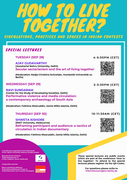Veranstaltungen
Digital Conference
How to Live Together? Circulations, Practices and Spaces in Indian Contexts

The manner in which diverse circulations including that of bodies, objects, ideas and cultural material have historically shaped social spaces in South Asia has been a topic of scholarly discussion. Is it possible to use this understanding of circulation to make sense of the situation in contemporary India where under a competitive authoritarian regime specific networks create proliferations around divisive notions of identity that mark certain sections of the population as outgroups? If so, what circulatory possibilities exist in terms of repertoires of living together that can create different kinds of proliferations to provide frameworks for peaceful coexistence?
The conference will focus on these questions and will engage with existing formations, movements and networks in India whose work contain such possibilities. Discussions will link the work of such initiatives with the academic debates around circulation, practices and emerging spaces in India.
The international digital conference is organised in the framework of RePLITO.
If you wish to register for this conference, please send a message to fritzi.titzmann@hu-berlin.de.
Interactive conference booklet in the flipbook view:
https://replito.de/replit_conference_booklet.html
Speakers:
Fathima Nizaruddin (Jamia Millia Islamia, Delhi):
“Neither a Hindu, nor a Muslim” - responding to right wing digital circulations in India by using the work of Kabir
Max Kramer (Freie Universität Berlin):
“A bird at my window”: Hindu-Muslim neighbourliness in Kashmir through the lens of independent documentary films
Saroj Kumar (Jamia Millia Islamia, Delhi):
New media and Dalit vision for an egalitarian society
Dhanya Fee Kirchhof (Humboldt-Universität zu Berlin):
Circulating notions of belonging and respectful coexistence through Ravidassia music videos
Ajay Gudavarthy (Jawaharlal Nehru University, Delhi):
Secular sectarianism and the art of living together
Ravi Sundaram (Center for the Study of Developing Societies, Delhi):
Performative violence and media circulation: a contemporary archaeology of South Asia
Ulka Anjaria (Brandeis University, Waltham):
Everyday lives on screen: feminism and self-documenting in ”Connected Hum Tum”
Mallika Leuzinger (Princeton University/Humboldt-Universität zu Berlin):
Amateurism, or the strange and radical kinship of the camera
Stefan Binder (University of Zurich):
“This is the life of Kotis“: On queer temporality, class, and kinship in Hyderabad
Ketaki Chowkhani (Manipal Academy of Higher Education, Manipal):
A Home of one’s own: singlehood and housing in urban India
Shweta Kishore (RMIT University, Melbourne):
Reframing participant and audience: a tactics of circulation in Indian documentary
Ruchira Ganguly-Scrase (independent scholar, Australia) & Timothy Scrase (University of Melbourne):
Darjeeling, 1980-2020: from rural idyll to congested town
Satoshi Miyamura (SOAS, London):
Labour organising across productive and reproductive relations in India: a comparative labour regime perspective
Rahul Mukherjee (University of Pennsylvania):
Mobile circulations: translocal solidarities and disruptions in India
Weitere Informationen
Veranstalter: "Beyond Social Cohesion - Global Repertoires of Living Together (RePLITO)" (Main Call Exploration Project Social Cohesion, BUA)
Unterstützt von: Berlin University Alliance, Rosa Luxemburg Stiftung
Leitung: Dr. Fathima Nizaruddin, Prof. Dr. phil. Nadja-Christina Schneider, Dr. Fritzi-Marie Titzmann
Kontakt
Prof. Dr. phil. Nadja-Christina Schneider
Telefon: 030 2093-66043
nadja-christina.schneider@hu-berlin.de